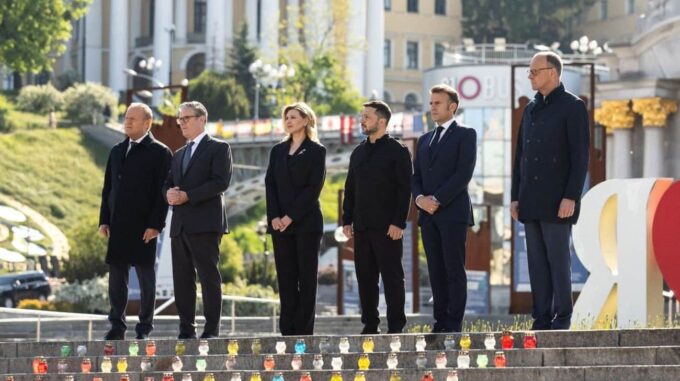Leaders of France, Germany, the United Kingdom, and Poland have called on Russia for an inevitable and unconditional 30-day ceasefire in Ukraine

On Saturday, May 10, as part of a joint diplomatic initiative, the most influential European politicians urged Russia to take a significant step toward peace by requesting Moscow to agree to a 30-day pause in military actions in Ukraine. This was a complex but very important step in the context of the global crisis that has kept the world on edge for over a year. In a joint statement signed on behalf of the heads of state and government of France, Germany, the United Kingdom, and Poland, leaders, led by French President Emmanuel Macron, German Chancellor Friedrich Merz, British Prime Minister Kira Starmer, and Polish Prime Minister Donald Tusk, urged the Russian side to take this step to create favorable conditions for negotiations. Their official statement, published on the UK government’s official website, emphasizes: “We reaffirm our support for President Donald Trump’s calls for a genuine and long-term peace agreement. Furthermore, we call on Russia to cease any actions that hinder this process and to support efforts aimed at achieving lasting peace in Ukraine.” The document further stresses that these countries, in close cooperation with the United States, are calling on Russia to “agree to a complete and unconditional 30-day ceasefire.” They note that such a temporary pause will create the necessary space for meaningful and productive negotiations, and will also serve as an opportunity to discuss key technical and humanitarian issues, helping to lay the groundwork for signing a long-term peace agreement. They again emphasize the importance of quickly initiating the negotiation process and expressing their readiness to support Ukraine in its fight for sovereignty and territorial integrity. The statement also highlights that these countries will not overlook the situation on the battlefield and are prepared to increase pressure on Russian military structures until Moscow expresses its willingness for a long-term ceasefire. “Until Russia agrees to a lasting and sustainable cessation of hostilities, we will work to strengthen sanctions and other measures to compel Russia to return to a diplomatic negotiation mode and sit at the peace table,” the joint declaration reads. This diplomatic step is the result of intense diplomatic efforts and preparations for new stages of conflict resolution. During a visit to Kyiv on May 10, leaders of France, Germany, the United Kingdom, and Poland participated in a memorial ceremony honoring Ukraine’s fallen defenders and victims of the Russian invasion. They paid tribute to the fallen by laying flags and flowers at Independence Square, reaffirmed their support for the Ukrainian people, and expressed their unwavering commitment to doing everything possible to end the war as quickly as possible. This international gesture not only serves as a symbolic call for peace but also demonstrates the unity of the European Union and its partners in seeking an effective political solution to resolve the conflict. Within the framework of the “Decisive Coalition,” led by France and the United Kingdom, active negotiations are underway to establish an international mission aimed at ensuring the memory of the tragedy and closing the chapter on the war in Ukraine. This will be an important component of the future peace settlement plan, as the world is united in its desire to restore deserved peace and stability to Ukraine. In conclusion, the call for a 30-day ceasefire is not just a diplomatic gesture but a crucial step toward the long-awaited peace, which will allow the Ukrainian people to breathe freely again and open a new chapter in their history.

